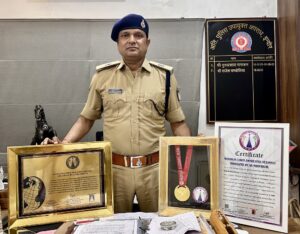Mrs. Kiran Bedi made history as the first woman to join the Indian Police Service (IPS) in 1972, breaking both societal and institutional barriers for women in India. Her trailblazing journey not only redefined the role of women in policing but also left an indelible mark on the Indian criminal justice system through her reforms and leadership.
Kiran Peshawaria Bedi , June 9, 1949 , Amritsar, Punjab, India
- Family Background: Kiran Bedi was born into a progressive Sikh family. Her father, Prakash Lal Peshawaria, was an army officer, and her mother, Bimla Peshawaria, was a housewife. Her parents instilled a sense of discipline, hard work, and service to the nation in her from an early age.
- Education: Kiran Bedi was an outstanding student. She earned a Bachelor’s degree in English from Delhi University and later pursued a Master’s degree in Political Science. She also completed a law degree and earned a Doctorate in Social Sciences from the Indian Institute of Technology (IIT) Delhi.
- Breaking Barriers: In 1972, Kiran Bedi became the first woman to be inducted into the Indian Police Service (IPS), an achievement that shattered traditional gender norms and opened the door for women in the Indian police force. She joined the service after clearing the highly competitive civil services exam.
- Initial Posting: She was initially posted as an Assistant Superintendent of Police (ASP) in Tiruchirappalli, Tamil Nadu, and quickly gained a reputation for her no-nonsense attitude, leadership, and commitment to the job.
- Notable Leadership: During her career, Kiran Bedi held several significant positions in the Indian Police Service, including the role of Inspector General of Prisons in Delhi, where she made transformative changes to the prison system. Her bold initiatives aimed at reforming prisons and improving the living conditions of prisoners earned her national and international acclaim.
- Prisoner Welfare: She emphasized the importance of rehabilitation and education for prisoners, setting up programs that helped prisoners learn vocational skills and engage in constructive activities.
- Tihar Jail Reforms: She is best known for her work at Tihar Jail, one of the largest prison complexes in India. Kiran Bedi introduced measures such as meditation, yoga, and sports to help prisoners reform and reintegrate into society.
- Promoting Women’s Rights: Kiran Bedi also worked extensively on women’s issues, advocating for gender equality, and promoting the recruitment of women in the police force. Her success in the IPS inspired countless women to pursue careers in law enforcement.
- Handling High-Profile Cases: Throughout her career, Kiran Bedi handled several high-profile cases with diligence and integrity, often earning praise for her fearless approach to law enforcement.
- “Navjyoti India Foundation”: In 1988, Kiran Bedi founded the Navjyoti India Foundation, a non-governmental organization focused on education, health, and social welfare. The foundation works with underserved communities, particularly in the areas of drug rehabilitation and prevention of crime.
- “India Vision Foundation”: She later founded the India Vision Foundation to address corruption, drug abuse, and prison reform. Her work aimed at empowering marginalized communities has been widely recognized both in India and abroad.
- Community Policing: Kiran Bedi championed the concept of community policing to bridge the gap between the police and the public. Her work in this area earned her respect from various quarters, particularly in relation to public engagement and crime prevention.
- Padma Shri: Kiran Bedi was awarded the Padma Shri, one of India’s highest civilian honors, in 1980 for her contributions to the Indian Police Service and for her exemplary service in improving the prison system.
- Magsaysay Award: In 1994, Kiran Bedi was honored with the Ramon Magsaysay Award for Government Service, recognizing her reforms in the Indian police and prison systems, as well as her leadership in promoting social justice.
- UN Recognition: She was also recognized internationally for her work and was appointed as the UN Civilian Police Advisor for United Nations peacekeeping operations.
- Retirement from IPS: Kiran Bedi retired from the Indian Police Service in 2007, after serving for over 35 years in various capacities.
- Political Career: In 2015, Kiran Bedi joined BJP (Bharatiya Janata Party) and was nominated as the party’s Chief Ministerial candidate in the Delhi Assembly elections. While she did not win the elections, her involvement in politics was an extension of her commitment to public service.
- Author and Speaker: Post-retirement, Kiran Bedi became a prominent author, motivational speaker, and social activist. She has written several books on topics like leadership, prison reform, and women’s empowerment.
- Role Model for Women: Kiran Bedi’s journey from being the first woman IPS officer to a prominent social reformer and political figure has inspired millions of women in India and abroad. She proved that women could excel in challenging and traditionally male-dominated professions.
- Impact on Policing: Her contributions to prison reform, community policing, and women’s empowerment in law enforcement have left a lasting impact on the police service in India.
- Inspiring Leadership: Kiran Bedi’s leadership style, marked by integrity, commitment to social change, and fearlessness, has made her one of India’s most respected figures in public service.
Kiran Bedi is a trailblazer who not only broke the gender barrier by becoming the first woman IPS officer but also revolutionized Indian policing through her reforms, leadership, and commitment to social causes. Her legacy continues to inspire individuals, especially women, to take up challenging roles and contribute to society. Through her innovative work in prison reform, community policing, and women’s empowerment, Kiran Bedi has solidified her place as one of India’s most influential public servants.







